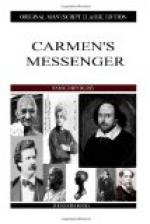Then the girl clerk looked up and when Foster inquired for letters threw him two. His companion asked for his, giving the name of Telford, and she indicated the lettering on the wicket.
“Farther along, where you came from! Can’t you read the alphabet?”
“I can, now I see it,” said the other good-humoredly as he turned back.
On the whole, Foster was glad he had picked up the letters as the girl threw them down. It is customary in Western cities for people to call for their mail and girl clerks are sometimes curt, but she seemed to think it strange that the fellow had come to the wrong wicket. If he had had an object for doing so, he had learned Foster’s name, but the latter did not think he had seen the postmarks or that one letter had an English stamp. Still, he had noted that Foster’s boots were wet, which indicated that the latter had gone farther than the post office.
He went out before he opened the envelopes, and then glancing at the letters put them in his pocket with a thrill of satisfaction, meaning to read them carefully after breakfast. Entering the hotel, he hung up his coat and went to the dining-room. He was promptly served, and when he went out after finishing his meal, saw Telford, who had apparently just returned from the post office, standing in the passage, which was rather dark. It looked as if he had been hanging up his coat, but he stood near Foster’s, and then moved on abruptly as another man came up.
Foster met them and saw that the last was the man whom he had half-suspected of watching Telford on the first evening. As he passed, he took the letters from his coat, and entering the rotunda sat down and lighted his pipe. It was possible that Telford had meant to search his pockets, but had been prevented by the appearance of the other, and Foster frowned. He was feeling the strain of the constant watchfulness and getting tired of intrigue. As a matter of fact, he hated that kind of thing, and it would be a keen relief when he could attend to his proper business and finish with the need for caution. In the meantime, he did not know if he had found a fresh clew or not. After all, he had not much ground for suspecting Telford.
Then Foster forgot his perplexities as he took out the letters. The first was from Lucy Stephen, who said that the doctor had visited Lawrence and was satisfied with his progress. She added that Foster knew Lawrence disliked writing letters, but she wanted to reassure him and wish him good luck. The note was short, but seemed to put Foster on a footing of intimate friendship that he was grateful for, and he thought Lucy had written with this object.
The other was from Alice Featherstone and his heart beat as he studied it. She did not say much; they had still no news of Lawrence and her father was very restless and anxious, while she feared her mother felt the suspense. But she knew Foster would make every effort and would not fail them; there was nobody else who could help. All she said struck a note of quiet confidence. Her faith was unshaken; she trusted him.




